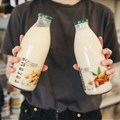World Plant Milk Day, celebrated on 22 August, is a global occasion to acknowledge the innovation and impact of plant-based milk alternatives.

Source: Supplied.
To mark this day, we spoke with Philip Moufarrige, the founder of AmberMacs and the driving force behind Giraf Macadamia Milk.
Giraf Macadamia Milk, made from South African-grown macadamias, is known for its rich, creamy texture and the absence of added vegetable and seed oils. It caters to consumers seeking a dairy alternative that emphasises health and quality.
In this feature, we explore the origins of Giraf Macadamia Milk, the obstacles encountered during its inception, and its dedication to sustainability.
Can you tell us about the inspiration behind starting Giraf Macadamia Milk and how it all began?
The AmberMacs Macadamia Factory in White River supports a farming community of over 200 farmers who produce some of the world's best
macadamias. With global pricing and demand for macadamia constantly fluctuating, many farmers are challenged to consider alternative markets to sustain their livelihoods.
Challenge often breeds solutions, and this inspired us to develop Giraf Macadamia milk in case we found ourselves at the end of harvest season with unsold macadamia nuts.
It seems like an unlikely scenario, as macadamia nuts are always in short supply, but with milk, we can mash any unsold nuts into a paste to make nut butter, chocolate spreads, milk, and other delicious products that are also good for you!

Philip Moufarrige, the founder and MD of Giraf Macadamia and CEO of AmberMacs, image supplied.
What are the key benefits of macadamia milk compared to other plant-based milk alternatives?
Macadamias are high in omega 3, 6, and 7 and are unique as having the lowest carbs and the highest levels of good fats of all nuts. So, unlike oat and almond milk, our milk is always rich and creamy without adding vegetable or seed oils. In addition to being plant-based, our original macadamia milk is low in sugar and calories, but still rich and creamy enough to make cappuccinos.
What challenges did you face during the initial stages of launching Giraf Macadamia Milk, and how did you overcome them?
Formulating an excellent product that can be mass-produced without compromising taste, quality, or versatility was a big challenge. We wanted to make the perfect milk that frothed in cappuccinos, was delicious to drink on its own, and was even better than dairy. The development process of Giraf Macadamia Milk took a full four years!
Giraf Macadamia seems to place a high value on sustainability. Can you elaborate on your sustainability practices?
It takes tons of water to grow almonds, but macadamia trees thrive in much drier climates and require comparatively and significantly less water. Even so, we ensure that all our farmers are AmberGAP-certified, which ensures they employ regenerative agricultural practices that look after our soils, ecosystems, natural predators, and water supplies.
We will soon be making our macadamia milk locally, and to sell it in Europe, we send pure macadamia paste to our sister factory in Italy to make the milk there, creating a much smaller carbon footprint than shipping the milk internationally.

How do you ensure the quality and consistency of your products from farm to table?
We know all our farmers personally, and that relationship creates a sense of ongoing trust and collective responsibility. We visit the farms regularly and test all deliveries rigorously for quality and freshness.
We pay our farmers based on quality, so it is in their interest to produce the best possible macadamias on the planet! We have also built an online shared resource called Ambercircle.co.za to allow farmers to share information and publish articles on specific farming topics.
What has been the response from consumers and the market since the launch of Giraf Macadamia Milk in South Africa and the UK?
The response has been overwhelmingly positive. People who try Giraf Macadamia milk say it’s the best-tasting nut milk they’ve ever had, super
versatile in smoothies, cereals, cocktails, and cooking, and fairly priced.
What advice would you give to aspiring entrepreneurs who want to enter the plant-based food and beverage industry?
9/10 start-ups fail. Be warned: It’s hard work, but it helps to have an edge or a unique selling point. A successful business meets a real need. Just because you think you’ve got a good idea doesn’t mean it will work, so do your research properly and keep things simple and honest. Look after your suppliers and listen to your customers!




































 How do you ensure the quality and consistency of your products from farm to table?
How do you ensure the quality and consistency of your products from farm to table? 
